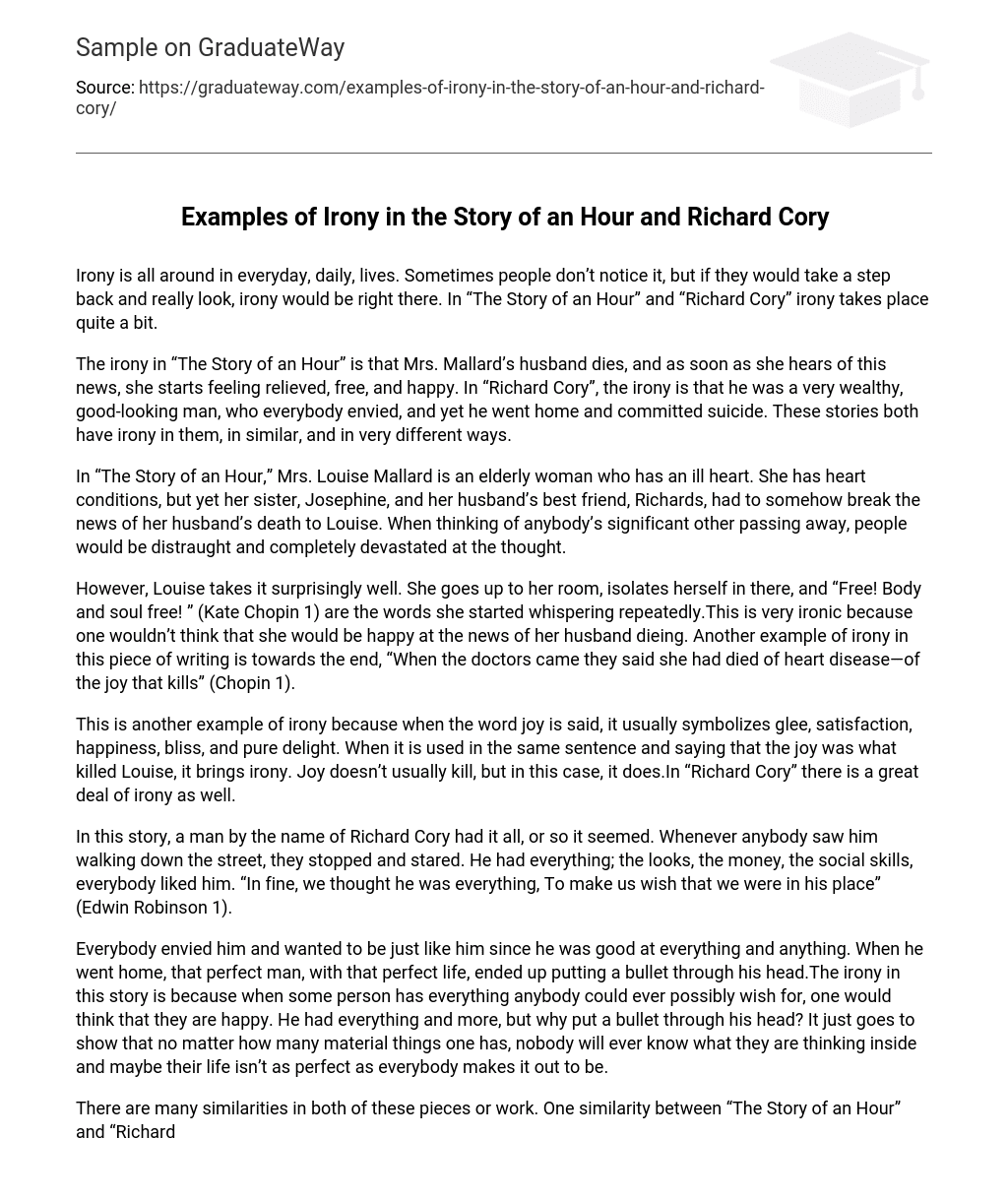Irony pervades our everyday lives without us always realizing it. However, if we were to pause for a moment and observe, irony would undoubtedly reveal itself. This is evident in both “The Story of an Hour” and “Richard Cory” where irony features prominently.
The irony in both “The Story of an Hour” and “Richard Cory” is present in contrasting yet parallel ways. In “The Story of an Hour,” Mrs. Mallard experiences a mixture of relief, freedom, and happiness upon learning of her husband’s death. On the other hand, the irony in “Richard Cory” stems from the fact that he is a highly prosperous and attractive man who is envied by everyone, yet he ultimately takes his own life. While the stories share irony as a common element, they each convey it in unique manners.
“The Story of an Hour” centers around Mrs. Louise Mallard, an elderly woman with a weak heart. Despite her fragile health, it was up to her sister, Josephine, and her husband’s close friend, Richards, to inform her of her husband’s demise. The news of losing a loved one would naturally cause intense grief and despair for anyone.
Despite the unexpected news of her husband’s demise, Louise reacts surprisingly calmly. She retreats to her room, secluding herself within its walls, and begins murmuring the words, “Free! Body and soul free!” (Kate Chopin 1). It is ironic to witness her apparent happiness upon hearing about her spouse’s death, as one would typically assume she would react with grief. Additionally, the irony continues towards the conclusion of the text with the statement, “When the doctors arrived, they declared she had passed away due to heart disease—of the joy that kills” (Chopin 1).
The word “joy” is often associated with positive emotions like glee, satisfaction, happiness, bliss, and pure delight. However, the irony arises when it is mentioned alongside Louise’s death. Normally, joy does not lead to fatal consequences but in this situation it does. The presence of irony can also be observed in “Richard Cory.”
Richard Cory, a man who seemed to possess everything including looks, wealth, and charm, captivated the attention of everyone he encountered. People couldn’t help but stop and gaze in awe as he walked by. He was admired by all, evoking a desire within them to trade places with him. As Edwin Robinson eloquently penned: “In fine, we thought he was everything, To make us wish that we were in his place” (1).
Everyone envied him, wanting to emulate his exceptional abilities in any field. However, upon returning home, the man who seemed to have the perfect life tragically took his own life. The irony lies in the fact that when someone possesses everything that others could desire, it is assumed they are happy. Despite having everything and more, why would he end his life? This incident serves as a reminder that regardless of the material possessions one may possess, their inner thoughts and feelings remain unknown, and their life may not be as ideal as it appears to others.
There are several similarities in both “The Story of an Hour” and “Richard Cory”. Firstly, both of these pieces of work contain examples of irony. Additionally, another common thread is that both main characters, Louise Mallard and Richard Cory, are depicted as wearing masks. Specifically, Louise is portrayed as wearing a mask of being happily married, despite actually feeling immense joy upon learning of her husband’s death.
Richard Cory is portrayed as wearing a mask of happiness and contentment in his life, despite ultimately being unhappy and taking his own life. Louise Mallard, on the other hand, dies from a heart condition. Despite these differences, both literary works exhibit various similarities and distinctions.
“The Story of an Hour” and “Richard Cory” both teach the important lesson that appearances can be deceiving. These stories show that it is unfair to judge people based on their external attributes such as wealth or a seemingly perfect life, as the individual may be struggling internally and experiencing great distress. The narratives also highlight irony and exhibit notable differences. Rest in peace, Louise Mallard and Richard Cory.





